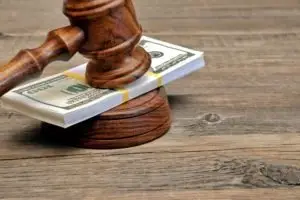
An individual may be ordered to pay restitution after being convicted of a crime in California. Restitution represents payment to the alleged victim of a crime, as a way to compensate the victim. Penal Code 1214 deals with restitution and its associations with civil judgment in California.
While PC 1214 is similar to civil judgments, it focuses on providing restitution in criminal cases. However, it does state that this kind of restitution is enforceable in the same way as in a civil judgment. Find out more about this subject with the Simmrin Law Group.
Restitution in Criminal Cases
A criminal act may leave an alleged victim with losses. These individuals are allowed to seek compensation through a restitution hearing. This hearing generally ends with a set dollar amount of restitution. The court requires the defendant to pay this dollar amount under PC 1214.
PC 1214 says the alleged victim can use different resources to collect compensation. There are many different resources available. For instance, the court system allows the alleged victim to:
- Garnish the defendant’s wages
- Put a lien on the defendant’s property
- Access the defendant’s financial records
In order to access the defendant’s assets, an individual has to request a statement of assets from the defendant. The defendant must sign this document. Note that reporting false information on this statement is considered perjury. This can lead to criminal charges.
Defining Victims and Losses Under PC 1214
The court system in California uses specific definitions for many legal terms. This includes terms like “victims” and “losses.” Individuals qualify as victims if they experienced actual or threatened:
- Physical harm
- Psychological harm
- Financial harm
Additionally, an individual’s family members could also be considered victims. Even an entity, like a business, could be classified as a victim in California.
There are many different kinds of losses in California. Individuals can seek compensation for any of these losses. This includes any property that was damaged, as well as lost wages, legal fees, or medical bills.
California allows victims to seek full compensation for their losses. Find out more about this process with the Simmrin Law Group.
Restitution Hearings
The court decides how much compensation an individual can receive by way of a restitution hearing. These hearings also allow the defendant to protest the amount of compensation requested by the victim. During a hearing, the court considers whether the defendant caused the victim’s losses and how much compensation to offer the victim.
Whether the Defendant Caused the Victim’s Losses
Establishing fault is an important part of a restitution hearing in California. During this portion of the hearing, the burden of proof rests on the victim. The victim must show that the accused was responsible for their losses.
Note that individuals can seek compensation as long as the accused played a substantial role in causing their losses. The accused does not have to be the only reason that the losses occurred. Contact a Los Angeles criminal defense lawyer today for more information.
How Much Compensation to Offer the Victim
Say the victim was able to show that the accused caused their losses. In this situation, the court then decides how much compensation to provide. Victims can provide evidence to support their request during this portion of the hearing, like their:
- Medical records
- Reports from their business
- Other bills
The accused can dispute the amount of compensation requested by the victim. However, in this case, the accused has to be able to show that the victim is asking for too much money.
After a restitution hearing, the judge determines how the defendant will pay the victim. In some cases, the court orders the defendant to make a one-time payment. This means the defendant has to pay the entire amount of restitution at once. In other cases, the court allows the defendant to set up a payment plan.
What Is the Burden of Proof in a Restitution Hearing?
The burden of proof in a restitution hearing is not as high as in a criminal case. In a criminal trial, the prosecution must prove “beyond a reasonable doubt” that the defendant is guilty of the crime with which they have been charged.
In a restitution hearing, on the other hand, the victim must only prove that the amount of money they are requesting is proper with “a preponderance of the evidence.” This means that it only has to be more likely than not that the amount they are claiming is equal to fair compensation for their damages.
The California Victim Compensation Program
For criminal victims unable to recover restitution directly from the defendant, there is another compensation option available. The California Victim Compensation Program (CalVCP) is a state fund that exists to provide compensation to violent crime victims. This program allows victims to recover money for unreimbursed losses associated with these crimes.
CalVCP is administered by the California Victim Compensation Board. The fund is largely composed of fines leveled against criminal defendants ranging from $100 for a minor infraction to $10,000 for a serious felony.
Criminal victims unable to recover restitution for one reason or another can attempt to get the compensation they need through CalVCP.
We Can Help You Handle Restitution and Civil Judgments Under PC 1214
Contact the Simmrin Law Group if you have questions about Penal Code 1214. PC 1214 allows victims in criminal cases to seek restitution with the same resources available in a civil judgment. Call us or fill out our online contact form to get help from a criminal defense lawyer in Los Angeles.
Reach out to us for help right now and receive a free consultation. A member of our team will review the facts of your case and answer all of your questions. We will present you with your legal options and advise you of the pros and cons of each approach. Should you choose to retain our services, we will get to work right away, building your case.
